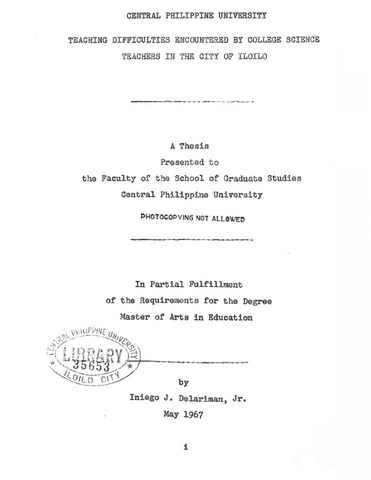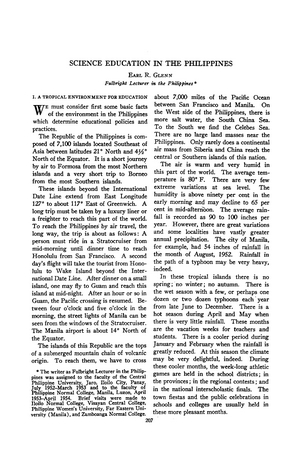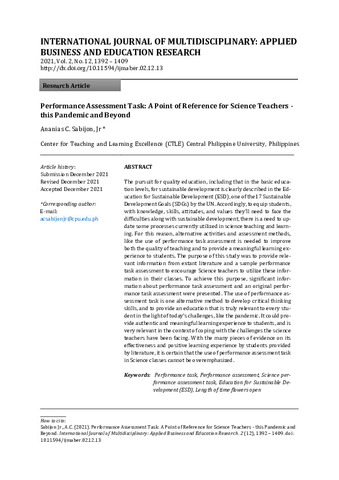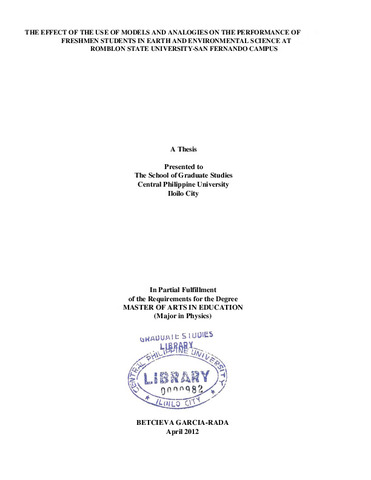Teaching difficulties encountered by college science teachers in the City of Iloilo

Page views
12,189Date
1967Auteur
Thesis Adviser
Defense Panel Chair
Share
Metadata
Afficher la notice complète
Résumé
This study was primarily concerned with factors which, in the opinion of the classroom instructors, handicap the teaching of science on the college level. In the main it was limited to the difficulties of which the teachers were conscious which influence their work with the students in the classroom. Most specifically, the study aimed: (1) to discover difficulties or limitations that were very common and generally widespread; (2) to identify and classify the various difficulties; and (3) to recommend suggestions to minimize these difficulties.
The main objects of this study were the college science teachers teaching the biological sciences, botany and zoology, and the physical sciences, chemistry and physics, in the four teen colleges and universities located in the City of Iloilo.
The study included all of the seventy-four college science teachers who taught biological and physical science courses during the first semester of the school year 1966-1967.
This was a descriptive survey study, using the questionnaire as its principal instrument. As an integral part of the investigation, a number of interviews were made with 75 per cent of the teachers, using the checklist and inter view guide as supplementary techniques to help validate the questionnaire, obtain additional information on the objectives of the investigation, and observe firsthand the factors pre sent, which were evident in the returned questionnaire and might affect the study in some way.
Of the seventy-six questionnaires distributed, seventy- four or 97.83 per cent were returned—forty-eight by women teachers and thirty-one by men teachers. Thirty-two were teaching chemistry; ten, physics; nine, zoology; and six, botany. The rest were teaching a combination of two or more science courses at the same time. Fifty-five were fulltime teachers and nineteen were part-time teachers.
The respondents had earned eleven different under graduate degrees before they started to teach. There were eighteen chemistry graduates; twelve, Bachelor of Science; eleven, Bachelor of Science in Education; and eleven, Pharmacy graduates. The rest had earned Bachelor of Arts, Bachelor of Science in Agriculture, Engineering (Chemical, Mechanical and Electrical), Bachelor of Science in Commerce, and Doctor of Medicine degrees. Forty-two reported having attended work shops, seminars, and institutes. Eighteen earned additional degrees in varied fields, nine of whom completed graduate courses—four, in MS and five, in MA.
The research study revealed the following most common difficulties encountered by the teachers: Foremost among the difficulties was the one related to lack of or insufficient resources, materials, equipment, and consultants. More than 40 per cent of the teachers inter viewed considered apparatus, chemicals, charts, models, specimens and audio-visual aids, the problem of inadequate resource persons, aquaria, terraria, and space for maintaining live animals and plants as critical to successful teaching.
Next in the order of the greatest difficulties en countered was the inadequacy of the library facilities. More than 40 per cent of the teachers interviewed expressed concern over the insufficient reading materials in science, especially the periodicals and the latest published editions of textbooks.
In many schools visited by the investigator, there was only a single copy or none of the text displayed in the library.
Most of the modern textbooks used by the teachers were only those owned by them. Periodicals were not up-to-date because most of these were only donated, occasionally.
The third common difficulty encountered was the one related to methods and techniques. The study revealed that 50 per cent of the teachers have difficulty in awakening interests of students in science, helping students to discover facts for themselves, and helping them to apply scientific principles. They felt they did not have the techniques necessary for their work.
Fourth in the order of difficulty was related to in adequate physical facilities. More than 40 per cent of the teachers interviewed reported the need for sufficiently large rooms to accommodate their large classes, adequate bulletin boards, exhibit tables, display space, and work tables.
The fifth difficulty was related to content, subject matter, and area of experience. Teachers deplore the fact that the science courses they took in college did not give them enough training to prepare them to teach adequately.
They also deplore the fact that there were not frequent seminars or workshops to help them keep up with recent trends in science insofar as techniques of teaching were concerned.
Another difficulty encountered was related to field trips, excursions and walks. Too much red tape, too much difficulty in planning, and too little time were some of the reasons for the difficulty. Other reasons given were the necessary risks, responsibility, and possible lawsuits involved in transporting students.
Another difficulty was related to personal qualities of the teacher, where teachers felt too inadequate to teach science because of their poor preparation and training to warrant confidence on their part to teach effectively. The difficulty related to supervision and administration was reported by 60 per cent of the teachers interviewed.
The study revealed that hardly any direct supervision was made of the teaching of science in schools.
One other difficulty reported by the teachers was related to the inability of the teachers to determine what to teach in science. Ten per cent of the teachers reported having met the difficulty of deciding what should be emphasized in their teaching when they have a heterogeneous group of students to serve.
Four teachers reported disinterest and laziness incorrect study habits, and inability of the students to talk coherently as some of the difficulties they encountered.
On the bases of the above findings, the investigator recommends that:
1. Workshops and seminars should place great emphasis on skills designed to develop resourcefulness in the improvisation and use of materials and in the integration of ideas developed from curriculum building experiences such as work space and utilities. This means that among other things that must be considered in workshops is the need for shopwork, where teachers may learn how to improvise materials and equipment.
2. In-service training of teachers should be well- planned to promote varied activities, to promote teaching competency in orientation meetings, local and district demonstrations, interclass visitations, classroom observations, individual and group conference, seminars, and workshops.
Furthermore, teachers should be furnished with bulletins, guides, and other instructional materials. Active participation of teachers in the planning, implementation and evaluation of in-service education activities should be encouraged.
3. Schools offering biological and physical sciences on the introductory level should offer the kind of science course in keeping with the needs of teachers, rather than just developing the skills and technical knowledge of the potential physicists, chemists, zoologists, and botanists.
4. Science teaching must aim at developing the ability to apply principles of science, habits of critical thinking and skills in problem-solving.
5. The science classes must have permanent laboratory rooms equipped with adequate facilities, materials, and chemicals to work with.
In addition, further research should be made:
1. Studies to discover what competencies must be possessed by effective science teachers.
2. Comparative study of the students' interests in biological and physical sciences.
3. Studies to discover the effectiveness of using prepared laboratory manuals in science teaching.
4. Study of the value of laboratory work in physical and biological sciences for teachers in programs of general education.
Description
Abstract only
Suggested Citation
Delariman, I. J. , Jr. (1967). Teaching difficulties encountered by college science teachers in the City of Iloilo (Unpublished Master’s thesis). Central Philippine University, Jaro, Iloilo City.
Type
ThesisSujet
Keywords
Department
School of Graduate StudiesDegree
Master of Arts in EducationShelf Location
GSL Theses 378.242 D374
Physical Description
193 leaves
Collections
Related items
Showing items related by title, author, creator and subject.
-
Science education in the Philippines
Glenn, Earl R. (Wiley, 1959-04)This article describes the status of science education in the Philippines. It begins with a brief overview of the history of the country and environment and the context of education. It describes the teaching of science ... -
Performance assessment task: A point of reference for science teachers this pandemic and beyond
Sabijon, Ananias C., Jr. (Future Science, Malang, Indonesia, 2021-12)The pursuit for quality education, including that in the basic education levels, for sustainable development is clearly described in the Education for Sustainable Development (ESD), one of the 17 Sustainable Development ... -
The effect of the use of models and analogies on the performance of freshmen students in earth and environmental science at Romblon State University-San Fernando Campus
Rada, Betcieva G. (2012)This comparative study using quasi experimental design was conducted to compare the performance of freshmen Bachelor of Science in Hotel and Restaurant Management (BSHRM) students in Earth and Environmental Science at ...





